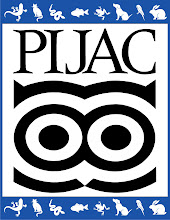FOR IMMEDIATE RELEASE
21 September 2010
PIJAC LAUCHES BD-FREE ‘PHIBS WEBSITE
PIJAC is pleased to announce that it is launching the official website for its “Bd-Free ‘Phibs campaign” – http://www.bd-freephibs.com. The campaign was initiated in November 2007 at an international conference that PIJAC co-hosted on amphibian declines and the fungal pathogen Batrachochytrium dendrobatidis (or Bd for short).
“Amphibians are the most threatened group of animals worldwide,” says PIJAC’s Vice President for Environmental Policy and Communications, Dr. Jamie K. Reaser, who did her doctoral work at
The disease caused by Bd, known as chytridiomycosis, is the worst infectious disease ever recorded among wildlife in terms of the number of species impacted and the severity of the impact.
Bd was initially detected in amphibians held in zoos for educational and conservation purposes. It has caused mortality in some collections and could put rare species (including those in captive propagation programs) at severe risk. There is increasing evidence that the commercial trade in amphibians for pet/hobby, food, biological supply, and bait purposes has resulted in the movement of Bd. Loss of Bd-infected amphibian in the commercial sector and within hobbyist collections could have a substantial economic impact.
The Bd-Free ‘Phibs campaign provides information for amphibian keepers on ways to help reduce the spread and impact of Bd on captive amphibian populations. It also strongly discourages the released of captive amphibians into the wild, where they could become invasive by infecting native amphibians with pathogens or parasites.
The new website provides an overview of the issue and campaign; information on how you can support the campaign; and links to resources for background information on Bd, as well as testing and treatment protocols. One of the most important and unique aspects of the website is a database ("Partners Forum) for sharing information on camp.aign-related projects. In the near future Bd-Free 'Phibs T-shirts and other materials will be available through an online store.
PIJAC strongly encourages amphibian keepers who are already engaged in Bd education, testing, and/or treatment to complete a profile on the Bd-Free ‘Phibs website’s Partners Forum page. In light of the recent Notice of Inquiry on amphibians and Bd released by the U.S. Fish and Wildlife Service (see the PetAlert on PIJAC’s Breaking News page; www.pijac.org), it is imperative that the pet industry demonstrate leadership and responsibility on this issue.
PIJAC thanks the Pet Care Trust and Reptiles Magazine for supporting the development of the campaign website. For further information, please see the Thank You page on the Bd-Free ‘Phibs website.
PIJAC membership is open to all segments of the pet industry, as well as individual pet owners. For information on how you can join, please contact Nancy Knutson, Director of Member Services, at members@pijac.org.
For more information on PIJAC, please visit: www.pijac.org.
-PIJAC-
PIJAC’s mission is to promote responsible pet ownership and animal welfare, foster environmental stewardship and ensure the availability of pets.




